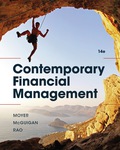
EBK CONTEMPORARY FINANCIAL MANAGEMENT
14th Edition
ISBN: 9781337514835
Author: MOYER
Publisher: CENGAGE LEARNING - CONSIGNMENT
expand_more
expand_more
format_list_bulleted
Concept explainers
Question
Chapter 14, Problem 9P
Summary Introduction
To determine: The probability of having negative earnings per share.
Expert Solution & Answer
Want to see the full answer?
Check out a sample textbook solution
Students have asked these similar questions
What does a high price-to-earnings (P/E) ratio indicate? a) A company is undervalued. b) A company is overvalued. c) High investor confidence. d) Low profitability. need help!!
What does a high price-to-earnings (P/E) ratio indicate? a) A company is undervalued. b) A company is overvalued. c) High investor confidence. d) Low profitability.
No ai
What does a high price-to-earnings (P/E) ratio indicate?
a) A company is undervalued.b) A company is overvalued.c) High investor confidence.d) Low profitability.
Chapter 14 Solutions
EBK CONTEMPORARY FINANCIAL MANAGEMENT
Ch. 14.A - Prob. 1QTDCh. 14.A - Prob. 2QTDCh. 14.A - Prob. 3QTDCh. 14.A - Prob. 2PCh. 14.A - Prob. 3PCh. 14.A - Prob. 4PCh. 14.A - Prob. 5PCh. 14.A - Prob. 6PCh. 14.A - Prob. 7PCh. 14.A - Prob. 8P
Ch. 14 - Prob. 1QTDCh. 14 - Prob. 2QTDCh. 14 - Prob. 3QTDCh. 14 - Prob. 4QTDCh. 14 - Prob. 5QTDCh. 14 - Prob. 6QTDCh. 14 - Prob. 7QTDCh. 14 - Prob. 8QTDCh. 14 - Prob. 9QTDCh. 14 - Prob. 10QTDCh. 14 - Prob. 11QTDCh. 14 - Prob. 1PCh. 14 - Prob. 2PCh. 14 - Prob. 3PCh. 14 - Prob. 4PCh. 14 - Prob. 5PCh. 14 - Prob. 6PCh. 14 - Prob. 7PCh. 14 - Prob. 8PCh. 14 - Prob. 9PCh. 14 - Prob. 10PCh. 14 - Prob. 11PCh. 14 - Prob. 12PCh. 14 - Prob. 13PCh. 14 - Prob. 14PCh. 14 - Prob. 15PCh. 14 - Prob. 16PCh. 14 - Prob. 17PCh. 14 - Prob. 18PCh. 14 - Prob. 19PCh. 14 - Prob. 20PCh. 14 - Prob. 21PCh. 14 - Prob. 22PCh. 14 - Prob. 23PCh. 14 - Prob. 24PCh. 14 - Prob. 25PCh. 14 - Prob. 26PCh. 14 - Prob. 27PCh. 14 - Prob. 28PCh. 14 - Prob. 29PCh. 14 - Prob. 30PCh. 14 - Prob. 31PCh. 14 - Prob. 32PCh. 14 - Prob. 33PCh. 14 - Prob. 34P
Knowledge Booster
Learn more about
Need a deep-dive on the concept behind this application? Look no further. Learn more about this topic, finance and related others by exploring similar questions and additional content below.Similar questions
- What does a high price-to-earnings (P/E) ratio indicate? a) A company is undervalued.b) A company is overvalued.c) High investor confidence.d) Low profitability.arrow_forwardThe risk that cannot be eliminated through diversification is called: a) Market riskb) Credit riskc) Diversifiable riskd) Operational riskarrow_forwardNo AI The risk that cannot be eliminated through diversification is called: a) Market riskb) Credit riskc) Diversifiable riskd) Operational riskarrow_forward
- Don't use chatgpt Which of the following is a primary market transaction? a) Buying shares on a stock exchangeb) Buying bonds from a bondholderc) Initial Public Offering (IPO)d) Trading in derivativesarrow_forwardWhich of the following is a primary market transaction? a) Buying shares on a stock exchangeb) Buying bonds from a bondholderc) Initial Public Offering (IPO)d) Trading in derivativesarrow_forwardNo chatgpt! What is the term for a bond's fixed interest payment? a) Yieldb) Couponc) Principald) Discountarrow_forward
- No ai Which of the following is a primary market transaction? a) Buying shares on a stock exchangeb) Buying bonds from a bondholderc) Initial Public Offering (IPO)d) Trading in derivativesarrow_forwardWhat is the term for a bond's fixed interest payment? a) Yieldb) Couponc) Principald) Discountarrow_forwardNo Ai What is the term for a bond's fixed interest payment? a) Yieldb) Couponc) Principald) Discountarrow_forward
- I need help!! 12. A beta value of 1.5 indicates: a) Less risk than the marketb) Same risk as the marketc) 50% more risk than the marketd) 50% less risk than the marketarrow_forwardA portfolio with the highest expected return for a given level of risk is called: a) Risk-free portfoliob) Efficient portfolioc) Diversified portfoliod) Arbitrage portfolioarrow_forwarddon't use chatgpt!! The process of determining the present value of future cash flows is known as: a) Amortizationb) Discountingc) Capitalizationd) Compoundingarrow_forward
arrow_back_ios
SEE MORE QUESTIONS
arrow_forward_ios
Recommended textbooks for you
 EBK CONTEMPORARY FINANCIAL MANAGEMENTFinanceISBN:9781337514835Author:MOYERPublisher:CENGAGE LEARNING - CONSIGNMENT
EBK CONTEMPORARY FINANCIAL MANAGEMENTFinanceISBN:9781337514835Author:MOYERPublisher:CENGAGE LEARNING - CONSIGNMENT

EBK CONTEMPORARY FINANCIAL MANAGEMENT
Finance
ISBN:9781337514835
Author:MOYER
Publisher:CENGAGE LEARNING - CONSIGNMENT

Portfolio return, variance, standard deviation; Author: MyFinanceTeacher;https://www.youtube.com/watch?v=RWT0kx36vZE;License: Standard YouTube License, CC-BY